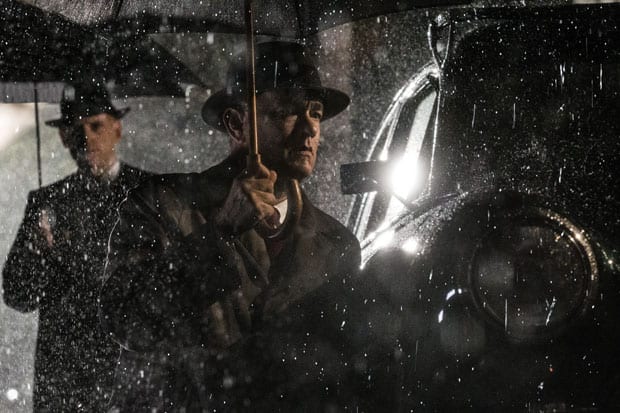Part political thriller, part legal drama, ‘Bridge of Spies’ kicks off Oscar race
ARNOLD WAYNE JONES | Executive Editor
jones@dallasvoice.com
In Raiders of the Lost Ark, his fifth feature film as a director, Steven Spielberg portrayed the bad guys as grinning, sadistic Nazis who craved supernatural power to achieve world domination. Bridge of Spies is Spielberg’s 28th feature, and my, how his perspective has evolved. Once again, the bad guys are German (as well as Russian); once again, the fate of the world may be at stake. But this time, there’s shadow and gradation and subtlety. “Don’t trust anyone,” one undercover Nazi ironically warns Indiana Jones in The Last Crusade. That could well be the watch-phrase for Bridge of Spies. Only this time, there’s genuine dread if it’s true.
 Based on actual events, Bridge of Spies is a deeply moral and principled film about a man of principles. We first meet Jim Donovan (Tom Hanks), a New York insurance attorney, as he parses language with an opposing counsel, explaining coolly, logically but forcefully the meaning of language and how profoundly we need to treat idea and words. Donovan is then unexpectedly tapped to defend Rudolf Abel (Mark Rylance), a Soviet agent spying on the U.S. There’s no doubt that Abel is guilty (to us, at least); there’s also no doubt that he’s entitled to a strong defense, and no one will accuse Donovan of being a toady for the powers-that-be. He’ll fulfill his lawyerly obligations, even at great personal cost … and even as everyone from the trial judge to the C.I.A. lobby to ensure Abel is executed.
Based on actual events, Bridge of Spies is a deeply moral and principled film about a man of principles. We first meet Jim Donovan (Tom Hanks), a New York insurance attorney, as he parses language with an opposing counsel, explaining coolly, logically but forcefully the meaning of language and how profoundly we need to treat idea and words. Donovan is then unexpectedly tapped to defend Rudolf Abel (Mark Rylance), a Soviet agent spying on the U.S. There’s no doubt that Abel is guilty (to us, at least); there’s also no doubt that he’s entitled to a strong defense, and no one will accuse Donovan of being a toady for the powers-that-be. He’ll fulfill his lawyerly obligations, even at great personal cost … and even as everyone from the trial judge to the C.I.A. lobby to ensure Abel is executed.At the same time, Francis Gary Powers is shot down in his U2 spying over Russia. The idea of an exchange of political prisoners is proposed, but due to the vagaries of Cold War diplomacy, there can’t be any “official” government involvement. Donovan is again enlisted to do his duty, though he sees his duty as very different from what the politicians expect.
Spielberg, of course, has often addressed serious issues in his films (Raiders is meant to be popcorn entertainment), and from Schindler’s List to Munich to Amistad, the humanity of governments has been a recurring theme in his films. But Bridge of Spies may be his most sobering look at the morality of a man’s character he’s yet tackled. Fine points of attorney-client privilege, the Fourth Amendment and high-level diplomatic negotiations fraught with unspoken intrigue aren’t especially cinematic or even populist, but Spielberg gives them heft without resorting to treacly underscoring. Indeed, aside from the fluid camera movement and the emotional resonance, this is as un-Spielberg as a film can look: Washed-out colors to the point of black-and-white; grainy film stock that conjures found newsreel footage. It can be as cold as the Cold War itself.
And yet Hanks warms it all. His doughy face and laconic demeanor have rarely served him as well in a role who has to be Everyman yet somehow also Better-than. No one can preach without sounding preachy like Hanks, who brings a Columbo-esque quality to Donovan. Bridge of Spies almost reinvents the spy thriller single-handedly, and it is the first must-see film of the Oscar season.
This article appeared in the Dallas Voice print edition October 16, 2015.


